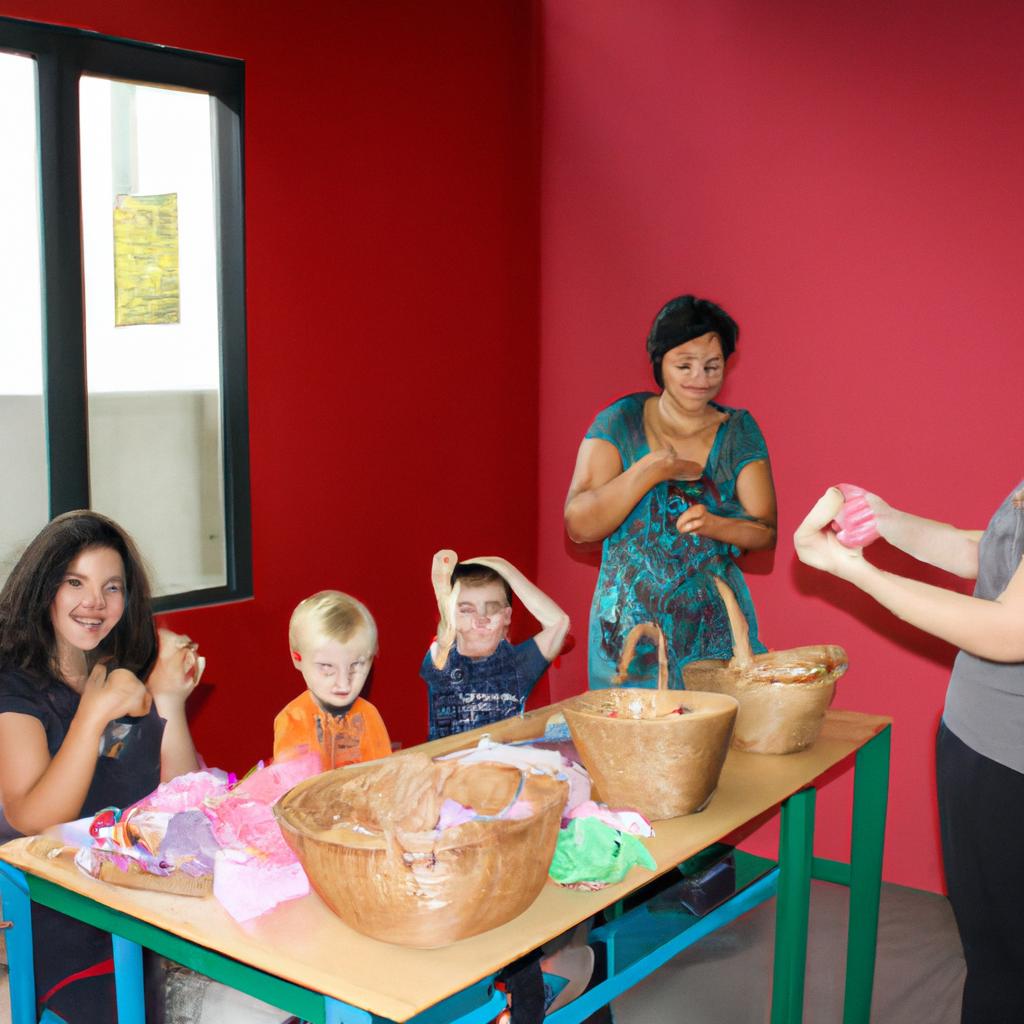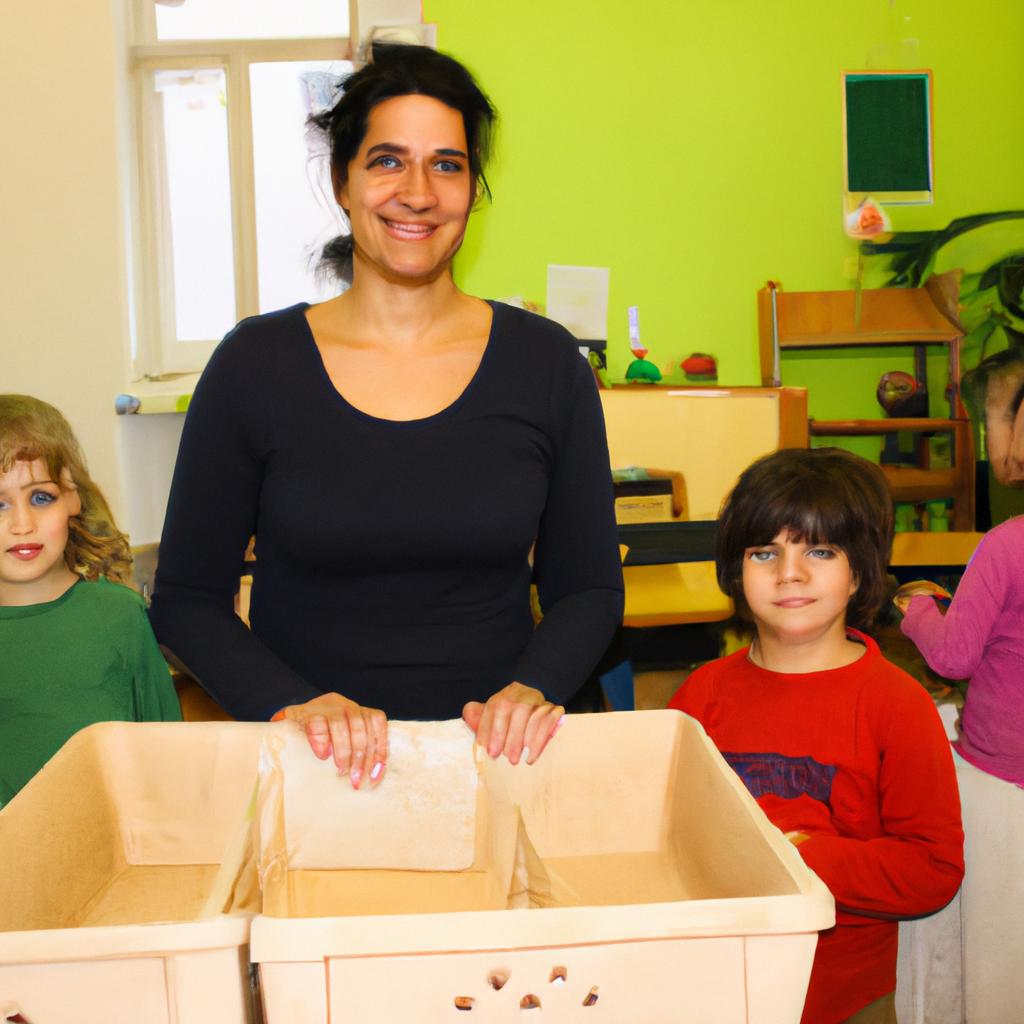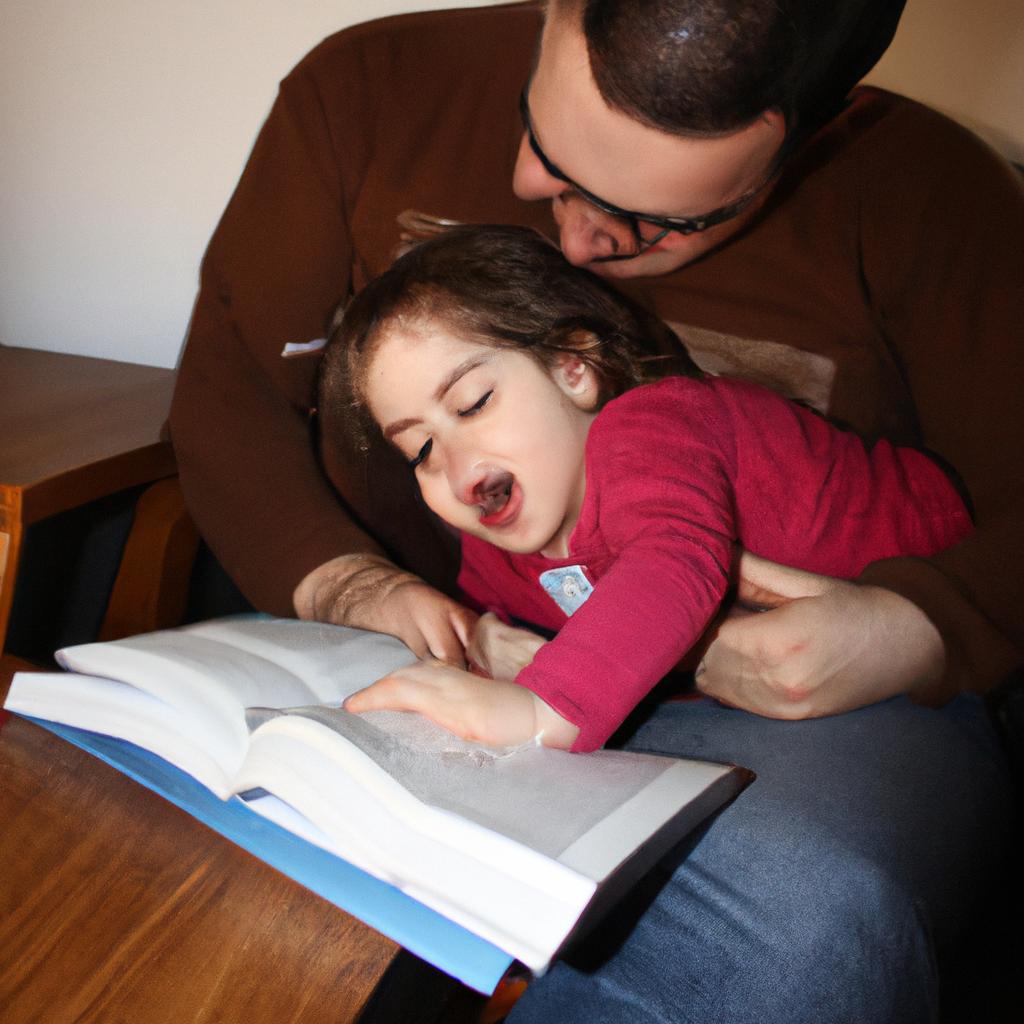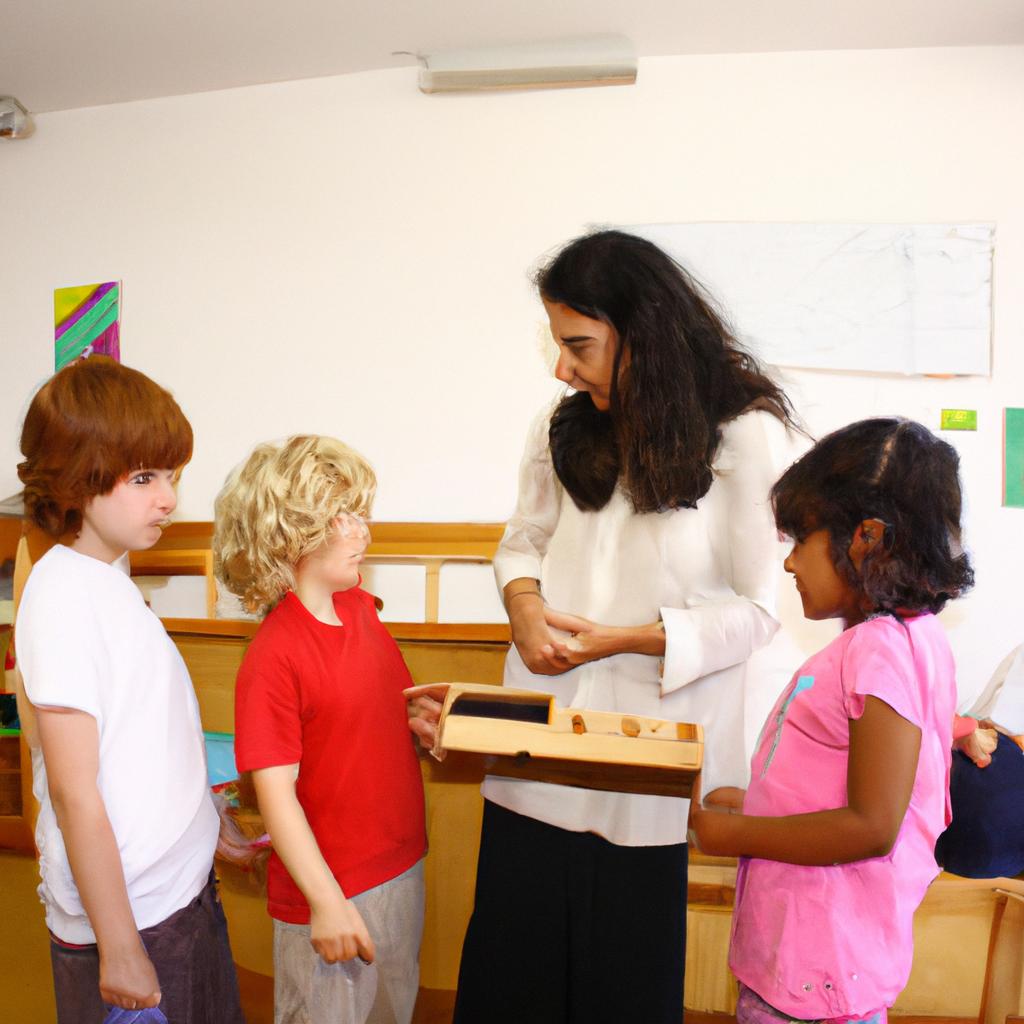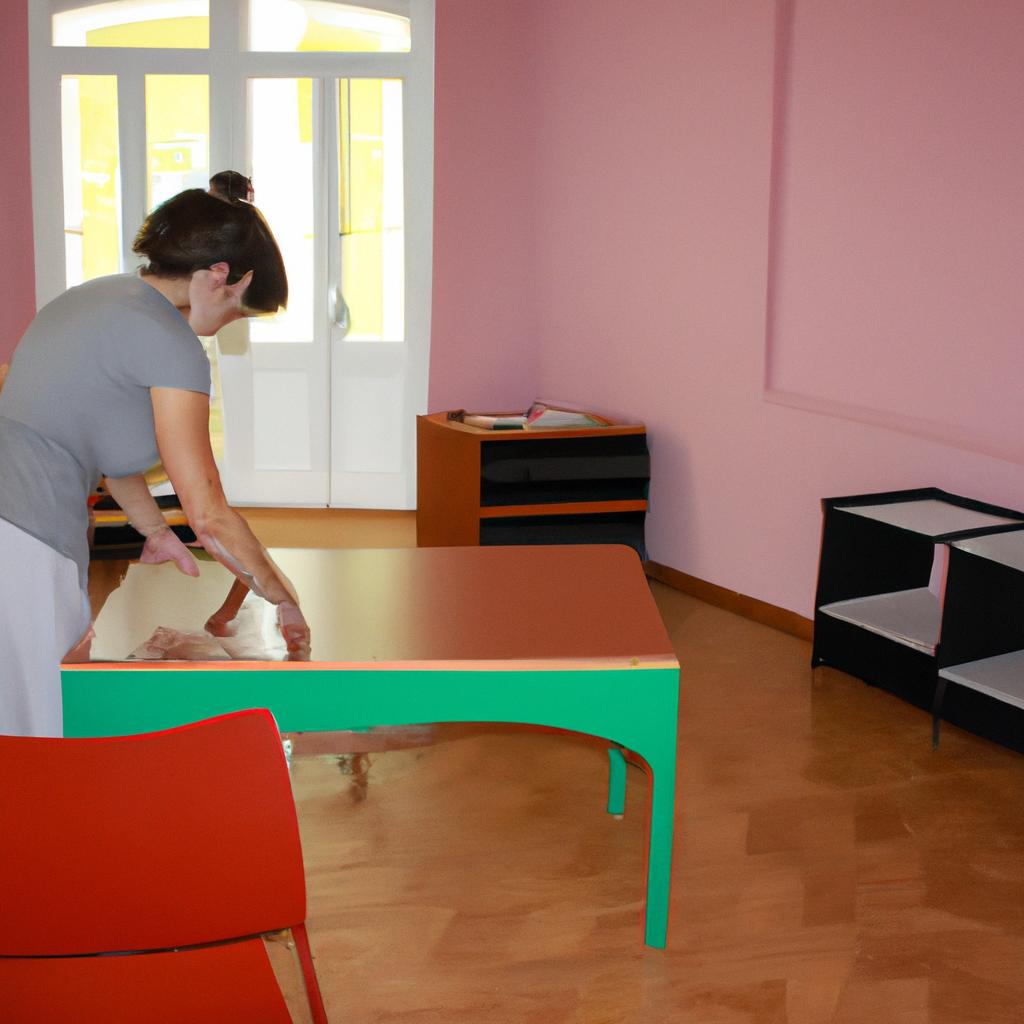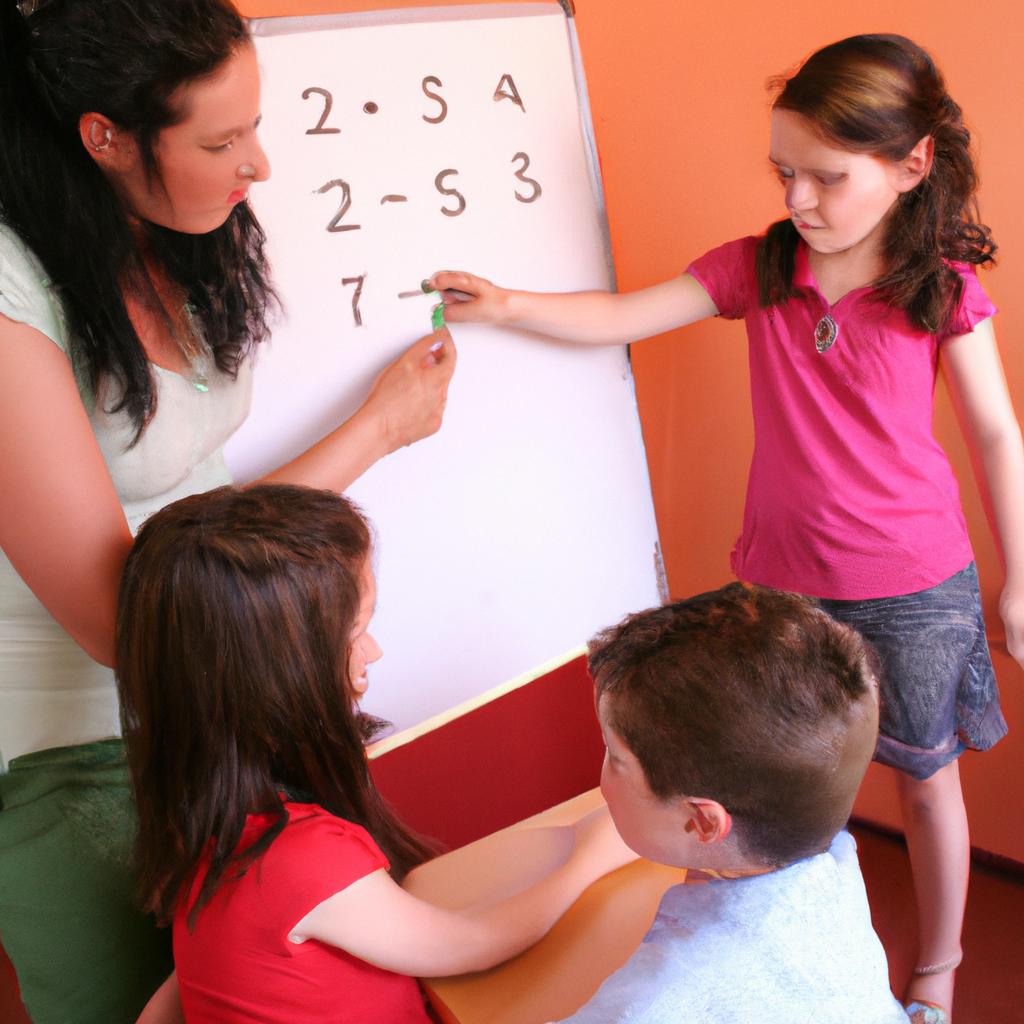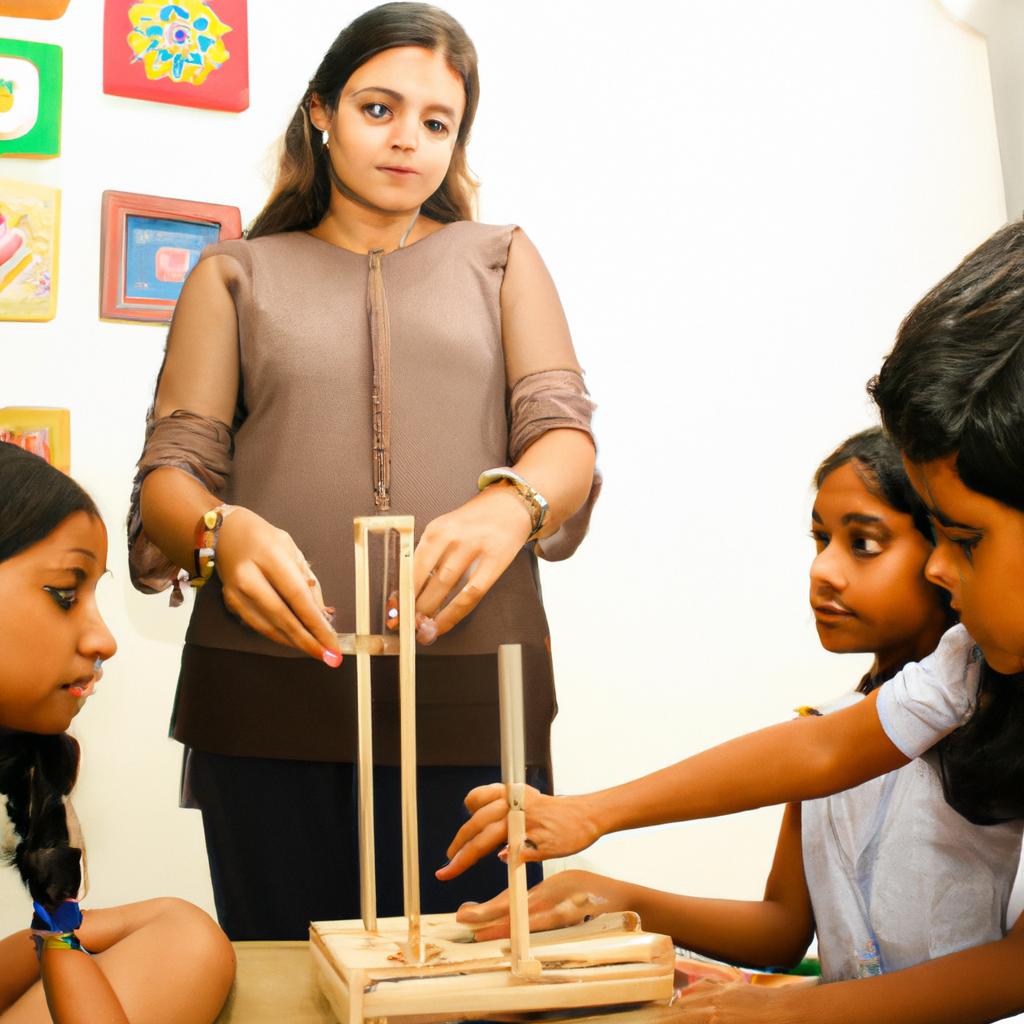In the realm of education, parent involvement has been widely recognized as a crucial factor in fostering children’s academic success and overall development. This is particularly evident within the context of Montessori schools, where parents are encouraged to actively engage in their child’s educational journey. For instance, consider the case of Sarah, a hypothetical parent whose daughter attends a Montessori school. Sarah’s active participation in her child’s schooling not only enhances her understanding of the unique Montessori approach but also strengthens the bond between herself and her daughter.
Montessori philosophy places great emphasis on collaboration between parents and educators for optimal learning outcomes. By involving parents in various aspects of their child’s education, such as attending workshops or volunteering at school events, Montessori schools create an inclusive environment that promotes holistic development. The benefits extend beyond simply supporting academic progress; increased parental involvement has been linked to improved social skills, self-esteem, and motivation among students (Epstein & Sanders, 2006). Thus, exploring effective ways for parents to engage with their child’s Montessori education becomes imperative in ensuring positive educational experiences for both children and their families.
Understanding the Montessori philosophy
Understanding the Montessori Philosophy
To fully engage in a Montessori school and support your child’s learning, it is important to understand the underlying philosophy that guides this educational approach. The Montessori method was developed by Dr. Maria Montessori in the early 20th century and emphasizes independence, freedom within limits, and respect for each child’s unique development.
For instance, let us consider an example of how the Montessori philosophy promotes independent learning. In a Montessori classroom, children have the opportunity to select their own activities from a carefully prepared environment. This fosters self-directed exploration and allows them to follow their individual interests at their own pace. By giving children ownership over their education, they become active participants in their learning journey.
Here are some key principles of the Montessori philosophy that can guide parent involvement:
- Foster independence: Encourage your child to take responsibility for daily tasks such as dressing themselves or preparing snacks. This builds confidence and develops essential life skills.
- Create a supportive home environment: Designate spaces where your child can engage in independent play and exploration with age-appropriate materials. Provide opportunities for open-ended creativity and problem-solving.
- Respect your child’s choices: Allow your child to make decisions whenever appropriate. Offer guidance when needed but also encourage them to think critically and learn from their mistakes.
- Emphasize practical life skills: Engaging your child in everyday household tasks like cooking or cleaning not only teaches valuable skills but also reinforces the importance of contributing to the family unit.
| Benefit | Emotional Response |
|---|---|
| Fosters independence | Empowerment |
| Supports individuality | Nurturing uniqueness |
| Develops critical thinking skills | Encourages growth |
| Promotes lifelong love for learning | Inspires curiosity |
In understanding these fundamental aspects of the Montessori philosophy, parents can actively support their child’s educational journey. By embracing the principles of independence and respect for each child’s development, you are fostering an environment conducive to growth and exploration.
Transitioning into the subsequent section about “Attending parent-teacher conferences,” it is important for parents to stay involved in their child’s education outside of the classroom as well.
Attending parent-teacher conferences
Understanding the Montessori philosophy is crucial for parents who wish to actively engage in their child’s education. With this knowledge, parents can effectively support their child’s growth and development within a Montessori school environment. One example of how understanding the Montessori philosophy can positively impact parent involvement is through promoting independence at home. For instance, parents might encourage their children to choose and prepare their own snacks or set up a designated area where they can independently complete tasks such as putting away toys.
To further engage with their child’s Montessori experience, parents can utilize various strategies that align with the Montessori principles. These strategies include:
- Encouraging open-ended exploration: By providing materials and opportunities for unrestricted exploration, parents allow children to follow their natural curiosity and develop problem-solving skills.
- Supporting respectful communication: Parents can model effective communication by using active listening techniques and encouraging dialogue that values each individual’s perspective.
- Fostering a love of learning: Engaging in discussions about topics covered at school, reading books together, and visiting museums or other educational sites can foster a lifelong passion for learning.
- Creating an organized environment: Implementing some aspects of the Montessori classroom setup at home, such as having child-sized furniture or organizing belongings into accessible storage solutions, helps promote independence and responsibility.
In addition to these strategies, it is essential for parents to be aware of their role in supporting both academic progress and emotional well-being. To illustrate this point further, consider the following table showcasing the potential benefits of parental involvement in a Montessori setting:
| Benefits | Description |
|---|---|
| Enhanced self-esteem | When parents actively participate in their child’s education journey, it boosts their confidence |
| Improved social skills | Regular interaction between parents and educators provides more opportunities for socialization |
| Strengthened bond | Parental involvement fosters stronger relationships between parents, children, and educators |
| Increased academic achievement | Engaged parents often have a positive impact on their child’s educational outcomes |
In conclusion, understanding the Montessori philosophy empowers parents to actively participate in their child’s education. By implementing strategies that align with this pedagogical approach and recognizing the potential benefits of involvement, parents can create an enriching environment both at home and within the Montessori school community. The next section will explore another significant aspect of parent engagement – volunteering for classroom activities.
Volunteering for classroom activities
Another important way for parents to engage in a Montessori school is by volunteering for classroom activities. By actively participating in the daily life of their child’s classroom, parents can gain insights into the Montessori approach and foster a strong sense of community.
Example: For instance, let’s consider Sarah, a parent who decides to volunteer at her daughter’s Montessori preschool. She spends an afternoon helping with various activities such as preparing materials, assisting children during work time, and facilitating group lessons. Through this experience, Sarah not only witnesses firsthand how the classroom operates but also gets to know her daughter’s classmates and teacher on a deeper level.
Volunteering for classroom activities offers several benefits for both parents and students:
- Increased understanding: By observing the learning environment and interacting with educators, parents gain valuable insight into the Montessori philosophy and teaching methods.
- Strengthened bond: Actively participating in their child’s educational journey fosters a stronger connection between parents and students.
- Enhanced communication: Volunteering provides opportunities for open dialogue between teachers and parents regarding curriculum goals, individual progress, and areas where additional support may be needed.
- Positive role modeling: When children see their parents actively involved in their education, they develop an appreciation for lifelong learning and engagement.
| Benefit | Description |
|---|---|
| Increased Understanding | Gain insights into Montessori philosophy and teaching methods |
| Strengthened Bond | Foster a stronger connection between parents and students |
| Enhanced Communication | Open dialogue with teachers about curriculum goals, individual progress, etc. |
| Positive Role Modeling | Develop an appreciation for lifelong learning through active parental involvement |
By volunteering in classrooms, parents contribute not only to their own child’s development but also create a supportive atmosphere within the entire school community. This hands-on involvement helps establish trust among all stakeholders – teachers, parents, and students – which is essential for a successful Montessori experience.
Participating in school events offers yet another avenue for parents to engage actively. This involvement goes beyond the classroom setting and provides opportunities to connect with other families while supporting the school’s overall mission and values.
Participating in school events
Volunteering for classroom activities is just one way that parents can actively engage in their child’s Montessori school experience. By participating in various school events, parents have the opportunity to further connect with their child’s education and contribute to the overall growth of the school community.
For instance, let us consider a hypothetical scenario where a parent, Mr. Johnson, volunteers during his daughter Emily’s art class at the Montessori School. During this session, he assists the teacher by organizing art supplies and providing individual guidance to students as they work on their creative projects. Through his involvement, Mr. Johnson not only supports his daughter’s learning but also fosters a sense of camaraderie among classmates by encouraging collaboration and discussion.
To further encourage parent engagement within Montessori schools, here are some additional ways parents can participate:
- Assisting with field trips: Parents can accompany students on educational outings, offering support and supervision while promoting experiential learning outside of the classroom.
- Organizing fundraising initiatives: By helping plan and execute fundraisers such as bake sales or auctions, parents play an active role in supporting the financial needs of the school.
- Contributing expertise: Parents can share their professional skills or hobbies through guest presentations or workshops that enhance student learning experiences.
- Joining parent committees: Getting involved in committees focused on areas like curriculum development or extracurricular activities allows parents to have a voice in shaping their child’s educational environment.
In addition to these opportunities for involvement, it is essential to highlight ongoing school events that provide avenues for parental participation. The table below showcases examples of common events found in many Montessori schools:
| Event | Purpose | Parental Involvement |
|---|---|---|
| Back-to-School Night | Orient new families and establish rapport | Attend information sessions |
| Science Fair | Showcase student scientific exploration | Serve as judges or assist with project setup |
| Cultural Celebrations | Promote cultural awareness and diversity | Contribute food, artifacts, or presentations |
| Parent-Teacher Conference | Discuss student progress and goals | Attend scheduled meetings to discuss child’s progress |
By actively participating in these events and engaging in various school activities, parents demonstrate their commitment to their child’s education while fostering a supportive educational environment. This involvement helps create stronger bonds between home and school, ultimately enhancing the overall learning experience for students.
In addition to being involved in classroom activities and school events, another way parents can support their child’s Montessori education is by establishing consistent homework routines.
Supporting homework routines
Participating in school events is an essential way for parents to engage with their child’s Montessori education. By attending these events, parents have the opportunity to witness firsthand the learning experiences and progress of their children. For example, imagine a parent attending a science fair at their child’s Montessori school. They observe their child confidently explaining scientific concepts and showcasing their project alongside peers who are equally enthusiastic about learning. This experience not only fosters a sense of pride but also highlights the importance of parental involvement in supporting their child’s academic journey.
- Experience joy as you watch your child showcase their accomplishments during exhibition days or performances.
- Connect with other parents, building a supportive network within the school community.
- Cultivate a stronger bond with your child by sharing memorable moments together.
- Foster a sense of belonging for both you and your child as active members of the educational environment.
Furthermore, incorporating a table can visually illustrate different types of school events that parents can participate in:
| School Events | Description |
|---|---|
| Parent-Teacher Conferences | Engage in one-on-one discussions with teachers regarding your child’s progress and development. |
| Open Houses | Attend informative sessions and tour classrooms to gain insight into Montessori teaching methods. |
| Field Trips | Accompany students on educational outings that enhance classroom learning through real-world experiences. |
| Cultural Celebrations | Participate in festive occasions that promote diversity and cultural understanding amongst students. |
By actively engaging in such events, parents create meaningful connections between home and school, fostering an enriching educational experience for their children.
Transitioning into joining parent committees or associations allows parents to take their involvement beyond individual events and contribute more significantly to the overall functioning of the Montessori school community.
Joining parent committees or associations
Supporting homework routines is just one way for parents to engage in their child’s education at a Montessori school. By actively participating in the learning process beyond the classroom, parents can help reinforce concepts and foster a sense of responsibility in their children. In this section, we will explore some strategies that parents can implement to support effective homework routines.
To illustrate the impact of parental involvement in homework routines, let us consider an example involving Emily, a six-year-old student attending a Montessori school. Emily struggles with completing her math assignments independently and often becomes frustrated. However, when her mother sits down with her and provides guidance during these sessions, Emily feels more confident and motivated to complete her work. This collaborative approach not only helps Emily understand challenging concepts but also strengthens the parent-child bond.
Here are some practical ways for parents to support homework routines:
- Establish a designated study area: Creating a quiet and organized space specifically for studying can enhance focus and concentration.
- Set consistent schedules: Developing regular routines for homework time ensures that it becomes an integral part of daily life.
- Provide necessary resources: Ensuring your child has access to relevant materials such as textbooks, writing utensils, and online resources can facilitate completion of assignments.
- Encourage self-reflection: Prompt your child to reflect on their progress after completing each task or assignment; this fosters critical thinking skills and encourages growth mindset.
- Increased confidence: Children feel supported knowing they have someone guiding them through their academic challenges.
- Improved communication: Regular interaction between parents and children during homework sessions facilitates better understanding of expectations and tasks.
- Strengthened motivation: When children see their efforts being acknowledged by their parents, they are encouraged to persist even when faced with difficulties.
- Enhanced independence: Through parental involvement, children develop the skills necessary to work independently and take responsibility for their own learning.
Moreover, parents can also use a table to capture these emotional responses in a concise manner:
| Emotional Response | Description |
|---|---|
| Increased confidence | Children feel supported and gain trust in their abilities. |
| Improved communication | Regular interaction improves understanding between parent-child. |
| Strengthened motivation | Recognizing efforts boosts enthusiasm towards learning. |
| Enhanced independence | Parental guidance helps children become self-reliant learners. |
By actively supporting homework routines and fostering an environment conducive to learning at home, parents play a crucial role in their child’s educational journey. Their involvement not only enhances academic performance but also contributes to the overall development of their child’s skills and attitudes towards education.

